Різдво: звичаї та традиції святкування
План-конспект уроку на заявлену тему. The objectives: to develop the skills in auding, speaking and reading in culturological texts; to improve the grammar skills using Participle I and Participle II; to revise the topic “Winter holidays"; to bring up the respect to folk traditions and customs
The development of the open lesson
 The subject of the lesson:
The subject of the lesson:
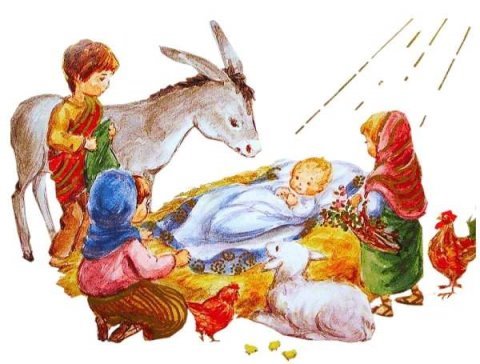 Teacher: Yulya Ivchenko-Cheholka
Teacher: Yulya Ivchenko-Cheholka
Form 8
The subject: New Year and Christmas in Great Britain and in Ukraine.
The objectives: to develop the skills in auding, speaking and reading in
culturological texts;
to improve the grammer skills using Participle I and
Participle II;
to revise the topic “Winter holidays”;
to bring up the respect to folk traditions and customs
Visual aids: tape-recorder, cassette, pictures, handouts
The procedure of the lesson:
1. Greeting, organizing moment. Introduction.
2. Warming-up activities.
3. Listening to the text “Christmas Twice”.
- Pre-listening activity. Acqainting with unknown words.
- Listening the text.
- Post-listening activities: a) answering the questions;
b) comprehension check (true or false);
c) matching the dishes to their descriptions.
4. Checking home assignment.
- Pupils’ reports about celebration Christmas holidays.
- Home-reading: “New Year in English-speaking countries”
Retelling the text and answering the questions.
5. Reading the text “Christmas in Great Britain”.
- Reading the text and discussing the most interesting facts.
- Putting the sentences in the right order.
6. Writing. Grammar.
Choosing the correct form of the Participle I and Participle II
7. Summing up. Evaluation pupil’s work.
8. Setting home assignment:
preparing reports about Saint Nickolas.
9. Song “Holy Night”.
Subject: New Year and Christmas in Great Britain and in Ukraine.
Proverbs: Every country has its customs.
So many countries so many customs.
Christmas comes but once a year.
Aim: 1. to develop the skills in auding, speaking and reading in
culturological texts;
2. to improve grammar skills using Participle I and Participle II;
3. to revise the topic “Winter holidays”;
4. to bring up the respect to folk traditions and customs.
Visual aids: tape-recorder, cassette, pictures, handouts.
Procedure:
1. Greetings and presentation of the plan of the lesson.
T – Good morning pupils.
Ps – Good morning, dear teacher.
T – Today we have got guests. Let’s greet them.
Ps – Good morning, dear guests.
T – I’m glad to see you, pupils.
Ps – We’re glad to see you too.
T – So, pupils, how are you?
Ps – Very well! Thank you.
T – All right! Sit down, please and let’s start our lesson. The first semester is coming to the end. I know you have much to do – tests in different subjects, a lot of revision. But the end of December is special because we are looking forward to the New Year and Christmas. So, the topic of our lesson is “New Year and Christmas in Great Britain and in Ukraine”. At our lesson we shall compare traditions and customs in different countries. By the end of the lesson you’ll be able to speak about holidays in our country and in Great Britain.
2. Warming-up activity. Dialogical speech.
T – Let’s start with asking and answering the questions according to the topic: “Winter holidays”, using such expressions as:
It’s interesting to know... I wonder... Can you tell me... Do you know...
I want to know... Tell me, please...
So, pupils, ask and answer the questions. Mind your intonation. Please, start.
P1 – It’s intetrsting to know where did you celebrate New Year party last year at home with your family, relatives or in the restaurant with your friends?
P2 – Last year I celebrated New Year party with my friends in the restaurant. And it’s interesting to know where did you celebrate New Year party?
P3 – Last New Year party I selebrated at home with my family and with my relatives. I wonder did you go to the village or stay at home during Christmas holidays?
P4 – During my Christmas holidays I went to the village with my family to celebrate Christmas and to have the Holy Supper with our grand-parents. Can you tell me when did you celebrate Christmas? I mean the date: the 25th of December or the 7th of January.
P5 – We celebrated Christmas on the 7th of January with my family.
And I want to know how many dishes did you have during the Holy Supper? What were they?
P6 – You Know that Holy Supper has 12 lenter dishes symbolic of the 12 Apostles who gathered with Jesus Christ at the last Supper. The meal is traditionally meatless and milk free. We had such dishes as kutia, beans, fish, varenyky (pyrogy), holubtsi, mushrooms, borhch, buns with fruit and poppy stuffing and compote made from dried fruit.
Tell me, please, did you go out singing carols with your friends and relatives?
P7 – Yes, I did. I went out singing carols with my friends and with our neighbours. And I wonder did you get any presents during Christmas holiday?
P8 – No, I didn’t.
P7 – Why not?
P8 – Because it isn’t a Ukrainian tradition. I got many presents during New Year holiday. Do you know in which countries do people have the tradition to give presents during Christmas holiday?
P9 – I know that children in Great Britain, in USA and in other English-speaking countries get presents during Christmas holidays. I want to know did you have the New Year Tree last year and which of you decorated it?
P10 – Yes, we had the New Year Three and decorated it with all our family because the Green Tree is the symbol of life. And during Holy Supper we put a decoration made from wheat, so-called “Didukh” as the symbol of prosperity.
T – So, you see. “So many countries so many customs”.”Every country has its customs”. These are proverbs of our lesson. Remember them.
 3. Listening the text “Christmas Twice”.
3. Listening the text “Christmas Twice”.
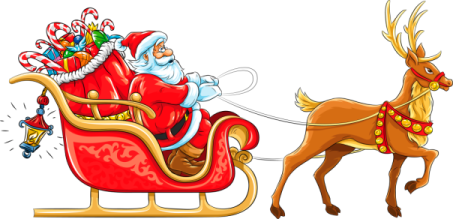
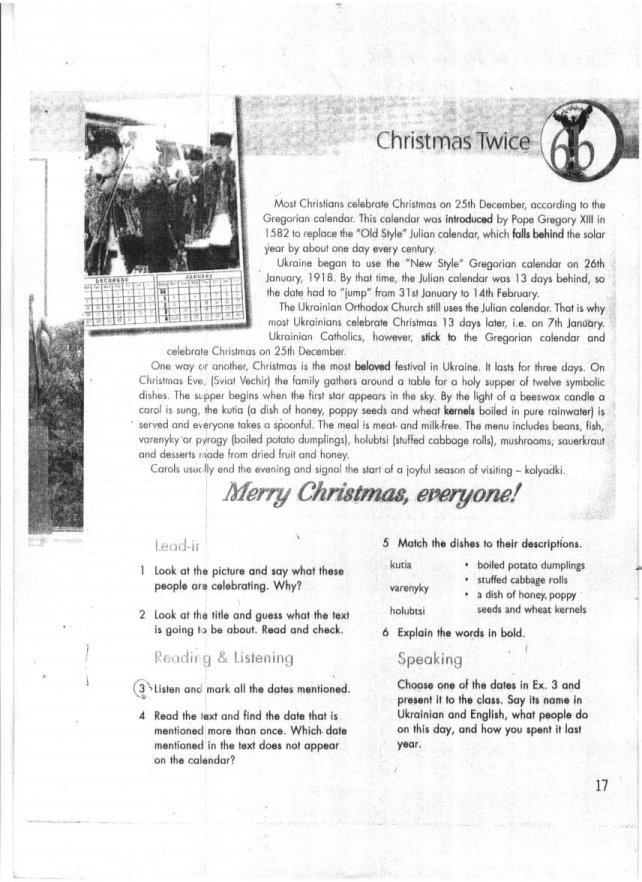
1) Pre-listening activity. Acqainting with unknown words.
T – And now, pupils, look at the pictures and say what these people are celebrating? Why do you think so?
P – To my mind these people are celebrating Christmas. I think so because they are wearing festive Ukrainian clothes, they are playing the music and singing songs. To my opinion these songs are Christmas carols. So, it is Christmas.
T – We’ll listen to the text “Christmas Twice”. Pay attention to the unknown words. Let’s read and explain them.
Pope Gregory XIII – папа Григорій ХІІІ
Beloved -- улюблений
To fall behind --відставати
To introduce –вводити
Kernel -- ядро
To stick to smth. – дотримуватись чогось
2) Listening.
T – Now listen to the tape-recorder. Please, be attentive. Mark all the dates mentioned. Try to understand what the date is mentioned more than once.
T – Listen to the text.
3) Post-listening activities.
a) Answering the questions.
T – So, pupils, tell me what the text is about?
P1 – The text is about Christmas in December and in January.
T – What the date is mentioned more than once? Which date mentioned in the text does not appear on the calendar?
P2 – The date – the 25th of December is mentioned twice. But this date does not appear on the calendar.
T – How do you think, why?
P2 – Because only the seventh of January is the state holiday in Ukraine.
b) Comprehension check (true or false).
T – Now let’s check up how did you understand the text. Choose the correct answer. Is it true or false? Why do you think so?
The correct answers.
1. – It is false because most Christians celebrate Christmas on the 25th of January.
b) Check up how did you understand the text. Choose the correct answer. Is it true or false?
1. Most Christians celebrate Christmas on 7th January according to the Julian calendar.
a) true b) false
2. Gregorian calendar was introduced by Pope Gregory XIII in 1582
a) true b) false
3. Gregorian calendar falls behind the solar year by about one day every century.
a) true b) false
4. Ukraine began to use the “New Style” Gregorian calendar on 26th January, 1918.
a) true b) false
5. The Ukrainian Orthodox Church still uses Gregorian calendar.
a) true b) false
6. Most Ukrainians celebrate Christmas 14 days later, on 8th January.
a) true b) false
7. Ukrainian Catholics stick to the Gregorian calendar and celebrate Christmas on 25th December.
a) true b) false
8. Christmas isn’t the most beloved holiday in Ukraine.
a) true b) false
9. On Christmas Eve, ( Sviat Vechir ) the family has a holy supper of Twelve symbolic dishes.
a) true b) false
10. The meal is meat- and milk-free.
a) true b) false
2. –It is true because it’s a historical fact.
3. –It is false because the “Old Style” Julian calendar falls behind the solar year by about one day every century.
4. –It is true because this is a historical fact.
5. –It is false because the Ukrainian Orthodox Church still uses Julian calendar.
6. –It is false because we know that most Ukrainians celebrate Christmas 13 days later, on the 7th of January.
7. –It is false. Ukrainian Catholics stick to the Julian calendar and celebrate Christmas on the 7th of January.
8. –It is false. Cristmas is the most beloved holiday in Ukraine.
9. –It is true because 12 lenter dishes symbolic of the 12 Apostles.
10. –Yes, it is true because during Holy Supper the meal is meat- and milk-free.
c) Matching the dishes to their descriptions.
T –Usually we prepare for holidays. We do the house, put a fir-tree and cook something tasty. Let’s remember the dishes we serve during Holy Supper and Christmas dinner. Listen to these descriptions and guess how do we call this food.
Match the dishes to their descriptions.
1. Kutia- a)boiled potato dumplings
2. Varenyky- b) stuffed cabbage rolls
3. Holubtsi- c) a dish of honey, poppy seeds and
wheat kernels
4. Buns- d) a dessert made from dried fruit and
honey
5. Compote- e) a dish of beet, carrot, onion,
cabbage, potatoes,beans and
tomatoes
6. Borshch- f) stuffed small round sweet cakes
4. Checking up home task.
1) Pupils’ reports about celebration Christmas holidays.
T – Pupils, I know you have prepared reports on topic “How I spent my last Christmas holiday.” I would like to listen to your projects.Who wants to present the project?
Pupils’ answers.
 2) Home-reading: “New Year in English-speaking countries”. Retelling the text and answering the questions.
2) Home-reading: “New Year in English-speaking countries”. Retelling the text and answering the questions.
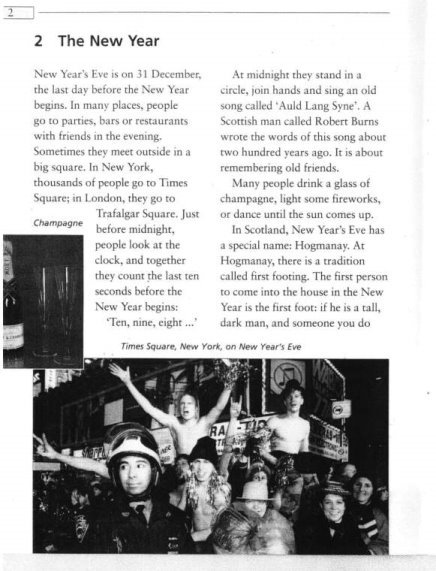
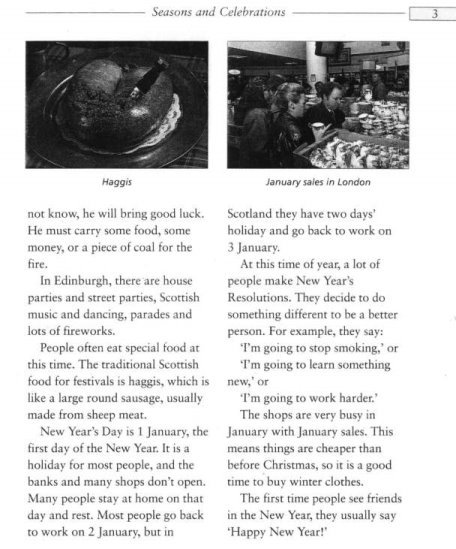
T – Ps answers.
- When do the people celebrate New Year’s Eve?
- Where do they go and where do they meet?
- What do the people look at just before midnightband why?
- And what can you tell us about an old song called “Auld Lang Syne”?
- What do the people do until the sun comes up?
- In Scotland New Year’s Eve has a special name. What is it?
- Is there a tradition called first footing? Could you tell us about the first footer?
- And what about the parties in Edinburgh?
- What is the traditional Scotish food?
- When do the most people have a rest and when do they go back to work? And what about Ukraine?
 5. Reading the text “Christmas in Great Britain”.
5. Reading the text “Christmas in Great Britain”.
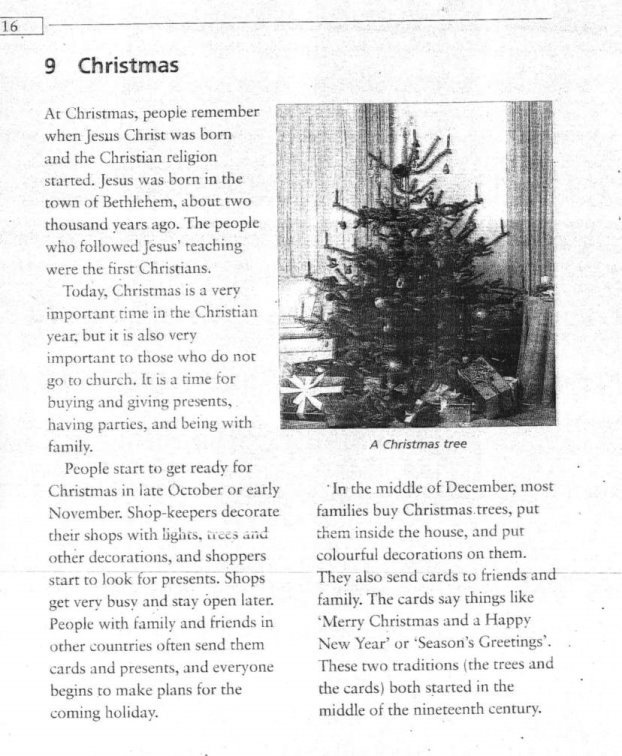
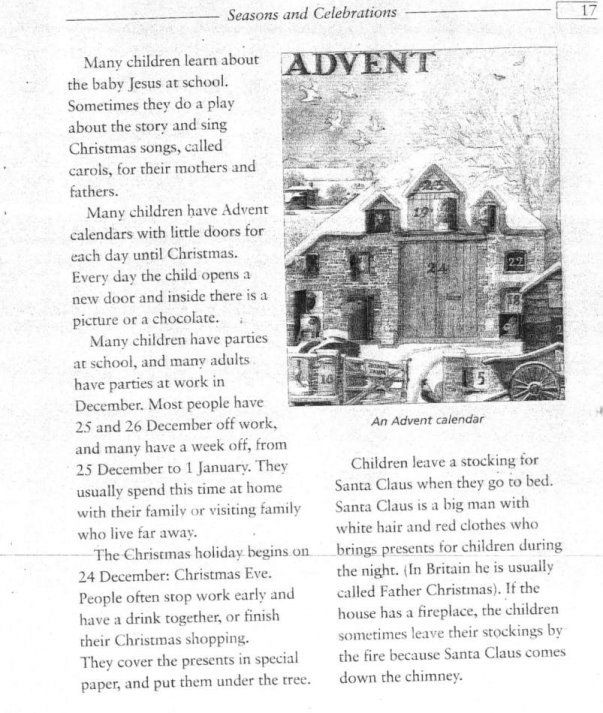
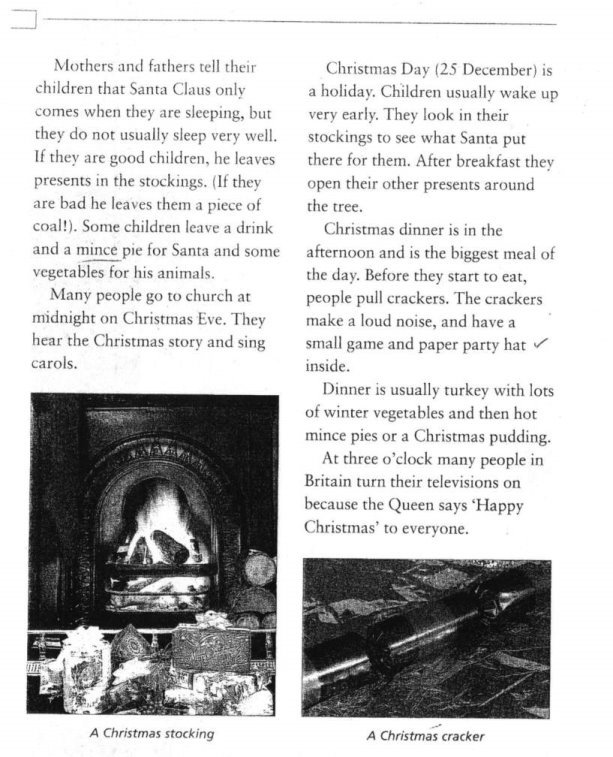
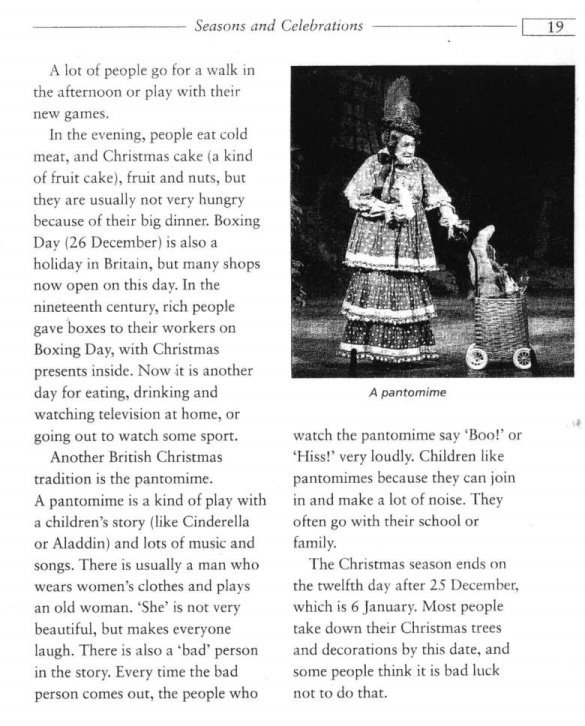
1) Reading the text and discussing the most interesting facts.
T – Now pupils you’ll read and discuss the text “Christmas in Great Britain”. Read and find the most inyeresting facts for you.
Pupils’ answers.
T – What do many children learn about at school during Christmas?
P1 – Many children learn about the baby Jesus at school. They do a play about the story and sing Christmas songs, called carols, for their mothers and fathers.
T – Could you tell us something about Advent calendar?
P1 – Many children have Advent calendars with little doors for each day until Christmas. Every day the child opens a new door and inside there is a picture or a chocolate.
T – And what do you know about Santa Clause and about Christmas stockings?
P2 – Children leave stockings for Santa Claus when they go to bed. Santa Claus is a big man with white hair and red clothes who brings presents for children during the night. In Britain he is usually called Father Christmas. If the house has a fireplace, the children leave the stockings by the fire because Santa Clause comes down the chimney. Some children leave a drink and a mince pie for Santa and some vegetables for his animals.
T – Where do the people go at midnight on Christmas Eve?
P3 – Many people go to church at midnight on Christmas Eve. They hear the Christmas story and sing carols.
T – How did rich people spend Boxing Day in the 19th century?
P4 – Rich people gave boxes to their workers on Boxing Day with Christmas presents inside.
T – Do the English children like pantomimes? And what is it?
P5 – A pantomime is a kind of play with a childrens story (like Cinderella or Aladdin). Children like pantomimes because they can join in and make a lot of noise.
T – When does the Christmas season end in Great Britain?
P6 – The Christmas season ends on the 12th day after 25th of December, which is the 6th of January. Most people take down their Christmas trees and decorations by this date, and some people think it is bad luck not to do that.
T – And what can you tell me about Christmas season in Ukraine?
Yes, it’s true. in our country Christmas season only begins on the 6th of January.
2) Putting the sentences in the right order.
T – Now put the sentences in the right order. – Pupil’s anser.
------------------------------------------------------------------------------------------------------After breakfast they open their presents around the tree.
In the evening people eat cold meat and Christmas cake, fruit and nuts.
Children leave a stocking for Santa Clause on Christmas Eve.
Before they start to eat their Christmas dinner, they pull crackers.
At three o’clock, many people in Britain turn on their televisions.
They usually wake up very early on Christmas Day.
6. Writing. Grammar.
T – And now let’s remind the Participle I and Participle II.
Choose the correct form of the Participle and fill in the blanks:
1. Children.....stockings for Santa Clause on Christmas Eve are happy
(left, leaving).
2. Children..... very early on Christmas Day like to receive presents.
(waking up,woken up).
3. The presents .....around the tree after breakfast were beutiful
(opening, opened).
4. The crackers..... before Christmas dinner were loud (pulled, pulling).
5. People.....their televisions are happy because the Queen says “Happy Christmas” to everyone (turning on, turned).
6. Cold meat and Christmas cake, fruit and nuts.....in the evening were very tasty (eating, eaten).
7. Summing up. Evaluation pupils’.
8. Setting Home assignment.
T – Prepare your own reports about Saint Nickolas.
9. Song “Holy Night”. Giving out the Christmas cards.
Silent night, Holy night !
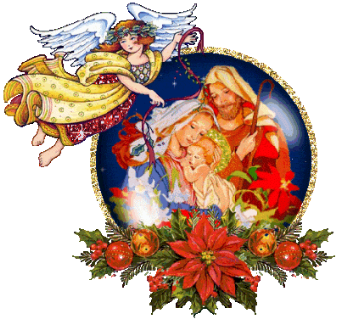 All is calm, all is bright.
All is calm, all is bright.
Round young virgin Mother and Child
Holy infant so tender and mild
Sleep in heavently peace,
Sleep in heavently peace!
Silent night, Holy night !
Shepherds quail at the sight
Glories stream from heaven afar,
Heavenly hosts sing Hallelujah.
Christ the Saviour is born!
Christ the Saviour is born!



про публікацію авторської розробки
Додати розробку
